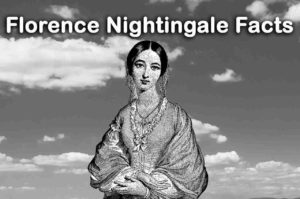Florence Nightingale Facts – Everything About Florence Nightingale

Florence Nightingale
Florence Nightingale (12 May 1820 – 13 August 1910) Florence Nightingale was a British social reformer and statistician, and the founder of modern nursing.
She came to prominence while serving as a manager of nurses trained by her during the Crimean War, where she organised care for wounded soldiers.
She was born into an upper-middle-class family at Lea Hurst, Derbyshire, England in 1820. She was the second of 12 children in a family whose members were active in progressive social reform movements of the time. Her mother was the well-known social reformer Mary Jane Nightingale (née Evans). Her father, William Edward Nightingale, was a wealthy landed gentleman and her uncle, Dr.
Her aunt was the scholar and women’s education advocate Mona Caird. She grew up in a family that was deeply involved in social reform and she acquired from them the belief that much could be achieved by caring for those around you; this inspired her lifelong devotion to helping others. However, she did not believe that women had an inherent “motherly instinct” and hoped to see the establishment of professional training schools for nurses.
She was educated at home by her mother and governess. In 1837, she began to grow ill. Her poor health meant that she was mostly confined to the indoors, where she studied literature, mathematics and science.
Nightingale did not enjoy being ill; instead it compelled her to spend a lot of time reading and studying. She said that “health is worth more than learning or great possessions”. With “the privilege of undisturbed solitude”, Nightingale wrote copious notes until her health improved in 1840. Two years after her mother’s death in 1841, Nightingale underwent a religious crisis which led to a strong desire for spiritualism.
Unable to confide in family members, she turned to her father’s friend, William Thompson, a liberal political theorist and Josiah Wedgwood the philanthropist who was married to her aunt Fanny. Nightingale’s first publication was a pamphlet titled “Hospitals: Essay on Nursing” (1860). In 1841, Nightingale became a trainee at the Institution for Sick Gentlewomen (better known as the London Hospital) under Drs.
The following year she wrote her Notes on Nursing. They were published in 1859 as a book with some of her notes and essays also included in The Ladder of Life and Other Unpublished Writings by Nightingale (1983).
These works established the principles of nursing practice and led to the creation of professional schools of nursing. As a nurse, her training was in the care afforded to sick people. She trained at the London Hospital where she was responsible for staffing and organizing the nursing staff at a time when it was not common practice to hire trained nurses.
She embarked on her mission to do social good after becoming unhappy about what she perceived as inequalities in healthcare treatment between rich and poor people. Nightingale’s primary focus became improving health care for women and children; however she also took an interest in sanitation reform, hospital planning, diet and public health issues, poverty, prison reform, education and home economics.
She became a pioneer in the collection of statistical data, and was granted access to data from the British government’s Registrar General by William Farr, the Registrar General. Nightingale received great recognition for her involvement with hospitals and contributed to a major decrease in mortality rates as a result of her research into statistics and hygiene.
In December 1853, Nightingale took charge of the female nursing staff at Dr. The hospital had been used by soldiers during the Crimean War (1854–1856). She organised care for wounded soldiers and helped improve health care on army bases by establishing “Nurses’ Homes” where nurses could rest between shifts. With the publication of Notes on Nursing in 1859, she became a well-known figure in Britain.
As a result of the fame she had gained from her nursing career and her statistical work for the government, Nightingale was well connected to politicians, statesmen and reformers. Nightingale continued to advocate for better healthcare and sanitation practice in army hospitals. She also helped get the Nurses Registration Act passed which required that nurses be registered by passing a qualifying examination.
During the American Civil War (1861–1865), Nightingale’s Notes on Hospitals (1861) was used to assist reform efforts in that country; it was used as a manual at Bellevue Hospital Medical College in New York City. After this success, Nightingale was asked to write Notes on the Army Medical Department (1869), which became a handbook for army hospitals.
She supported the women’s suffrage movement and spoke at a number of women’s rights meetings. Nightingale worked to mould public opinion by becoming a prolific author, writing on subjects such as domestic economy and homeopathic medicine, which she thought would increase public health through improved sanitation.
An advocate of the establishment of health statistics in Britain, she worked to teach nurses about using statistical data to improve healthcare outcomes. In 1872, Nightingale founded The Lady-in-Chief of the British Army Nursing Services (later renamed Queen Alexandra’s Imperial Military Nursing Service). Queen Victoria named her Baroness in August 1883, and this was a great honour for Nightingale.
Florence nightingale was fluent in other languages, including French, German, and Italian
She learned Turkish, the official language of the Ottoman empire, during her stay at a hospital in Constantinople. She also became fluent in Arabic during her time spent there.
Nightingale’s skill with languages allowed her to effectively communicate with patients and colleagues from a variety of different cultural backgrounds. Her ability to speak other languages helped her gain rapport with patients (she knew she didn’t have to rely on translators), resulting in observable improvements in their recovery process.
In 1851, Florence Nightingale defied the wishes of her parents and decided to pursue a career in nursing:
At the time, the vast majority of women were forced to stay at home and look after their families;
Men, on the other hand, often worked as doctors, lawyers or teachers;
Although they taught in schools and had many career opportunities, women were not encouraged to work in jobs like this. The only exception was nursing. Nurses became so popular with patients of all ages that they began to earn a good wage just by looking after them. Nightingale decided she wanted to be a nurse, just like her father: Although he disapproved of her choice of career because it was a woman’s job.
She refused to get married
Florence Nightingale is one of the most famous nurse to have ever lived. She is widely known for her achievements as she was the founder of the nursing profession. Florence’s love life was at the centre of much gossip, because she had many proposals from men, and however, she refused all of them and said that “Matrimony and nursing are incompatible”. Florence had many suitors but she had only one true love, her work.
Florence nightingale has her own museum
Florence nightingale has her own museum at St. Thomas’s Hospital, the hospital where she became famous for her work in nursing. The Museum holds the largest collection of Nightingale memorabilia in the world. It includes many of her belongings, including:
1) her prayer book, 2) carpet bag, 3) table from Scutari, 4) lamp from Scutari and a doll given to her by a patient while she was at Scutari, 5) watercolour drawings of Lambeth Palace and Waterloo Bridge by Nightingale’s father.
The Museum is housed in the Florence Nightingale Museum building which was opened in 1976. It was the first public building designed by the modernist architect, Richard Rogers. The Museum is open every day of the year except Christmas Eve, Christmas Day and Boxing Day.
Florence nightingale birthday is also International Nurses Day
International Nurses Day is celebrated every year on 12 May across the world. Florence Nightingale is acknowledged as the founder of nursing.
Florence Nightingale was born on 12 May 1820 in London. She is known for her pioneering work in improving health care and advancing social reforms within it. She had also argued that if nurses were trained well enough, doctors will not always be required as they are today.
Florence Nightingale is well known for her compassionate care for soldiers during the Crimean War in 1853-56
After a visit to hospitals in Scutari, Constantinople and Balaclava, where a terrible sanitary situation prevailed, she took it upon herself to improve the soldiers’ health conditions. She went so far as to take charge of the medical services at Scutari hospital herself. Nightingale had no previous knowledge of military medicine or how to run a hospital – all she had was determination. She was spurred on by her love and compassion for patients who were sick and dying from lack of proper care during this time of war where terror was king.
Florence Nightingale is considered to be one of the most outstanding social reformers in British history. The Crimean War was one of many events that led up to this point in history where they were great changes in society in regards to healthcare.
The nickname ‘Lady with the Lamp’
A respected authority on the nursing history of the Civil War period has written that Florence Nightingale “was given the title ‘Lady with the Lamp’ for her endless rounds at Scutari Hospital” (Garland 1994). More precisely, she was called “the Lady with the Lamp” because of a poem about her by Henry Wadsworth Longfellow. That is what she thought it meant and that is how she referred to herself as “the Lady with the Lamp.” Her crusade at Scutari had actually begun years earlier and it was her life’s work, not a temporary feature of it.
The myth that Nightingale first handled a lamp at Scutari Hospital after the Crimean War began is incorrect. She first used a lamp in her own bedroom in 1847, some six years before she went to the Crimea. Nightingale herself referred to “the Lady with the Lamp” in an 1859 book about her Crimean experiences, which means she referred to herself this way before Longfellow’s poem was published.
Nightingale struggled with an infection known as Crimean fever
One of the millions of stories of heroism in the time of war is that of Florence Nightingale. Her actions are still praised today for being one of the first nurses to attend to the wounded and sick in a field hospital. She fought many difficulties such as harsh conditions, long hours, and illness. One such illness was a disease known as Crimean fever. This disease exacted a heavy toll on her physical well-being, but not on her desire to fight on for her charges.
She never fully recovered from Crimean fever. The disease played a major role in her death on the August 13, 1910. All this occurred because of Florence Nightingale’s devotion to her work as a nurse.
She loved to write
“It is wonderful, the power of the pen,” stated Florence Nightingale in her personal journal. “I sometimes think God’s instrument has a very easy part in life compared to that of the pen.” Florence’s love for writing stemmed from her family background. She was surrounded by writers and statesmen: her father was an eminent judge; her uncle was the poet William Wordsworth; one brother became a famous architect and another, a famous artist. Florence herself is best remembered as a distinguished author, a pioneer in the field of nursing and an indefatigable social reformer. But there was more to her than her writings.
Florence nightingale improved sanitation in England
Everyone knows who Florence Nightingale is. But many people do not know why and how she improved sanitation in England.
She persuaded people to clean their hands before touching their food. It is said that she saved 1000s of lives because of her changes in sanitation. One night, she saw 12 (twelve) people die because there was not enough sanitary equipment. What was it like at that time? It may seem very strange to you now, but at that time many people used the same pot or bowl for both food and toilet! Many people used their hands to clean their bottoms.
In 1854, she was asked by the government to come and help with the soldiers in war. There were many soldiers (men) injured in the war. She went with 38 nurses. At that time, the wounded soldiers were ill because of unclean conditions and unclean food. The hospital was dirty. Almost all of them died because they had caught diseases.
She insisted that everyone must wash their hands with soap and water before they ate.
After the soldiers were well, she took some of the nurses to a nearby city called Scutari (SKUH-tah-ree). Many people had died there because there were no sanitary facilities. Florence and her nurses brought new ways to clean things. She made sure to clean the floors and walls of doctors’ rooms. She also made sure that beds had fresh sheets and clean pillows. During the war, she brought new thinking, new ways of doing things, and many changes in sanitation.
Read more Facts and Knowledge

